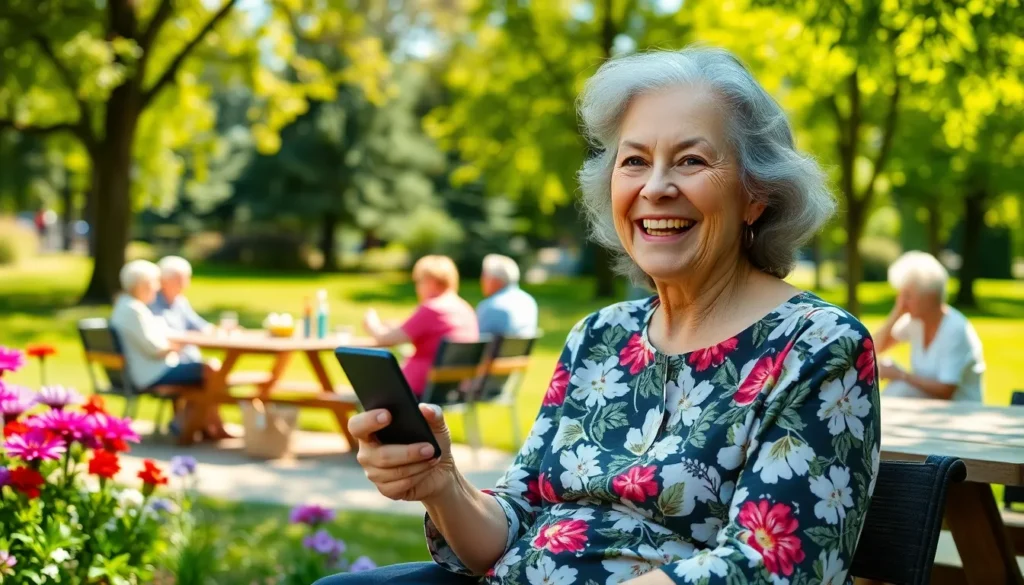Table of Contents
ToggleAs they age, many seniors face an often-overlooked challenge: social isolation. This growing concern affects millions, leading to loneliness and a decline in mental health. With family members moving away and friends passing on, the connections that once provided joy and support can dwindle, leaving many older adults feeling disconnected from the world around them.
The impact of social isolation goes beyond mere feelings of loneliness. Research shows it can lead to serious health issues, including depression, cognitive decline, and even increased mortality rates. Understanding the factors contributing to this issue is crucial for developing effective solutions. By addressing senior social isolation, communities can foster a more inclusive environment, ensuring that older adults lead fulfilling lives rich in social interactions and support.
Understanding Senior Social Isolation
Senior social isolation represents a critical challenge, affecting many older adults. Factors contributing to this phenomenon include physical limitations, mobility issues, and loss of loved ones.
Definition and Causes
Social isolation among seniors refers to a lack of meaningful social interactions and connections. Multiple causes contribute to this issue:
- Geographical distance: Many seniors live away from family members, limiting regular contact.
- Health concerns: Chronic illnesses and disabilities can restrict mobility, impeding social engagements.
- Social networks: Aging often leads to the loss of friends, resulting in fewer available companions.
- Technological barriers: Difficulty using modern communication tools may hinder connections with others.
- Mental health disorders: Conditions like depression or anxiety can result in withdrawal from social activities.
Impact on Mental Health
Social isolation severely impacts the mental health of seniors. Key effects include:
- Increased depression: Feelings of loneliness can exacerbate depressive symptoms, leading to a cycle of isolation.
- Cognitive decline: Lack of social interaction correlates with diminished cognitive function and increased risk of dementia.
- Anxiety: Seniors may experience heightened anxiety in social situations, discouraging engagement.
- Decreased self-esteem: Isolation can affect self-worth, contributing to a negative self-image and feelings of uselessness.
- Physical health: Poor mental health resulting from isolation can lead to physical ailments, creating a compounding effect.
Understanding these factors is essential for developing strategies that encourage social connectivity among seniors, fostering supportive communities.
Signs and Symptoms of Social Isolation


Recognizing signs of social isolation in seniors is crucial for early intervention. Various emotional and behavioral indicators can help identify those affected.
Emotional Indicators
- Feelings of Loneliness: Seniors often express feelings of loneliness and sadness, reflecting a lack of social connections.
- Depressive Symptoms: Increased irritability, lack of interest in activities, or feelings of hopelessness signify potential depression linked to isolation.
- Low Self-Esteem: Seniors may exhibit diminished self-worth, often stemming from perceived social exclusion and lack of interaction.
- Anxiety: A heightened sense of anxiety may emerge, particularly in social situations, due to the fear of rejection or judgment.
Behavioral Changes
- Withdrawal from Activities: Seniors may stop participating in hobbies or social events they once enjoyed, signaling a retreat into isolation.
- Reduced Communication: A noticeable decrease in phone calls, texts, or visits with family and friends indicates potential social detachment.
- Neglecting Personal Care: Changes in grooming habits or personal hygiene can signify emotional distress and diminished engagement with others.
- Changes in Eating or Sleeping Patterns: Alterations in appetite or sleep—such as eating less or sleeping excessively—can reflect struggles with mental well-being linked to social isolation.
The Importance of Addressing Senior Social Isolation
Addressing senior social isolation is crucial for promoting overall well-being among older adults. Failing to do so can lead to significant negative consequences.
Consequences of Neglect
Neglecting social isolation among seniors results in various adverse effects.
- Increased depression: Seniors who lack social connections often experience heightened feelings of sadness and despair.
- Cognitive decline: Limited interaction contributes to faster cognitive deterioration, impacting memory and decision-making skills.
- Heightened anxiety: Social isolation can amplify feelings of anxiety, leading to increased worry about health and safety.
- Decreased self-esteem: Seniors may struggle with self-worth when they feel disconnected from their communities.
- Physical health decline: Isolation correlates with poor physical health, as seniors may neglect medical care or healthy habits.
Awareness of these outcomes drives the urgency to tackle senior social isolation effectively.
Benefits of Social Engagement
Promoting social engagement among seniors leads to numerous benefits.
- Enhanced emotional support: Regular interactions provide seniors with essential emotional backing from friends and family.
- Cognitive stimulation: Engaging in conversations and activities sharpens cognitive functions and slows decline.
- Improved self-esteem: Strong social ties foster a sense of belonging, boosting confidence and self-worth.
- Healthier lifestyle choices: Active social lives encourage participation in healthy activities, including exercise and balanced nutrition.
- Longevity: Studies show that seniors with robust social networks often enjoy longer, healthier lives.
Emphasizing these benefits reinforces the need for communities to facilitate social connections among older adults.
Strategies to Combat Senior Social Isolation
Addressing senior social isolation requires a multifaceted approach involving community programs, resources, and technology. Effective strategies can significantly enhance the social engagement of older adults.
Community Programs and Resources
Community programs provide vital support for seniors seeking social connection. Local organizations often offer activities tailored to older adults, such as:
- Social Clubs: Social clubs create opportunities for seniors to meet peers through games, crafts, and discussion groups.
- Senior Centers: Senior centers serve as hubs for a variety of activities, including exercise classes, educational workshops, and health screenings.
- Volunteer Opportunities: Volunteering fosters social connections and enhances a sense of purpose by allowing seniors to contribute to their communities.
- Transportation Services: Transportation options help seniors access community events, health care appointments, and social gatherings, reducing isolation.
Communities should actively promote these resources and ensure that seniors are aware of available support to encourage participation.
Technology and Social Media
Technology facilitates connections that can alleviate social isolation for seniors. Effective use of technology includes:
- Video Calling: Platforms like Zoom or Skype enable face-to-face interactions, allowing seniors to maintain relationships with family and friends regardless of distance.
- Social Media: Websites such as Facebook or local community groups provide opportunities for seniors to connect and engage with both their peers and younger generations.
- Online Learning: Resources like webinars and online classes assist seniors in developing new skills while connecting them with others who share similar interests.
- Mobile Apps: Dedicated apps for seniors promote socialization through group activities, friendship matching, or shared interests.
Encouraging seniors to embrace technology—combined with training sessions to enhance digital skills—can help them stay connected with their communities.
Addressing senior social isolation is crucial for the well-being of older adults. By fostering meaningful connections and providing support through community programs and technology, society can help reduce feelings of loneliness and improve mental health. Recognizing the signs of isolation allows for timely intervention, ensuring that seniors receive the care they need.
Communities have the power to create inclusive environments where seniors can thrive. Through proactive measures and a commitment to enhancing social engagement, it’s possible to combat the adverse effects of isolation. Ultimately, the goal is to empower seniors to lead fulfilling lives filled with connection and purpose.



